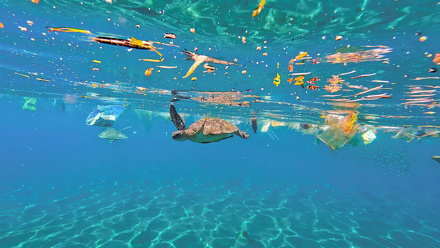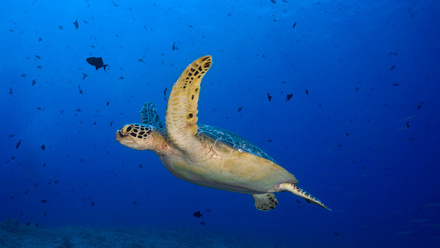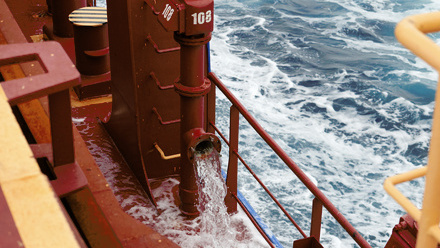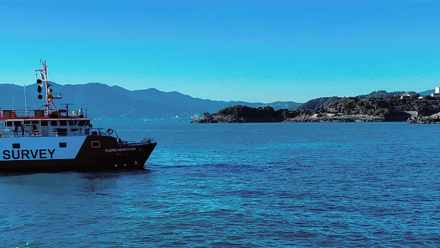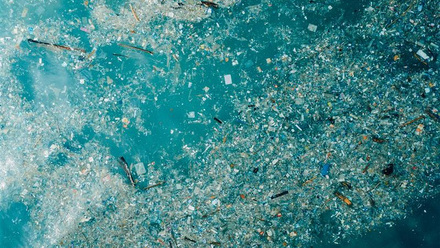Oceans under siege from disposable face masks
Marine conservationists are concerned about the discarded masks, gloves and sanitiser bottles littering beaches and seabeds as consequences of the pandemic.
Marine Professional talks to Professor Richard Thompson, one of the world’s foremost experts on plastic pollution, about solutions.
As the COVID-19 pandemic continues to wreak havoc around the world, it brings in its wake a trail of medical waste that threatens to add to the plastics already choking our oceans.
According to a study in Environmental Science & Technology, an estimated 194 billion disposable masks and gloves are being used worldwide every month as countries attempt to halt the tide of infection.
Before COVID-19 hit, most single use personal protective equipment (PPE), which is made from a variety of plastics, including polypropylene, polyethylene and vinyl, was used in hospitals and other medical or work settings with tightly controlled waste disposal procedures.
Now, however, as citizens embrace masks and gloves to protect themselves from infection, there are growing reports from marine conservationists of discarded masks, gloves and sanitiser bottles littering beaches and seabeds.
“In the midst of a global health crisis, we have to use this PPE but we should make sure we dispose of it correctly, not just to protect the marine environment but also those who have to clean up our waste,” says Professor Richard Thompson, OBE, Professor of Marine Biology, International Marine Litter Research Unit at the University of Plymouth.
One of the world’s foremost experts on plastic pollution and a Fellow of the Royal Society, it’s this total quantity that worries Professor Thompson.
“Hopefully this crisis will be relatively short-lived and in five to ten years’ time, the PPE should be a blip in the total quantity of pollution.”
Despite rising public concern about single use plastic, it continues to enter the ocean at a rate of 11 million tons a year, harming marine life and damaging habitats. A recent report from Ellen MacArthur Foundation and Common Seas, predicts the annual flow of plastic into the ocean could nearly triple by 2040.
Although progress has been made in addressing the global plastic challenge, commitments by governments and industry will reduce the annual volume of plastic flowing into the ocean by only about seven per cent by 2040.
Yet the Pew report, Breaking the Plastic Wave, shows there’s another way, because concerted global action using existing solutions and technologies could reduce annual flows of plastic into the ocean by about 80 per cent in the next 20 years.
Professor Thompson is not anti-plastic. He points out that plastics have many societal benefits, whether it’s PPE to protect healthcare workers, packaging to reduce food waste or lighter cars and planes to reduce fuel consumption. “But there’s no need for it to end up in our oceans,” he said. “So much of the waste is single use packaging, which is in service for a fleeting amount of time but its persistence as waste can be measured in hundreds, if not thousands of years.”
Improve the product life cycle
He recommends more effort goes into the life cycle of products, from the design of the product to its end-of-life, in order to recycle as much as possible. “There’s so much that can be done with existing technologies,” he said. “This problem can be fixed if everyone plays their part, from government, to industry to the end consumer.”
He pointed out that although food and beverage companies are keen to shout about the recyclable potential of their products, they are still falling short when it comes to reducing plastic waste.
“Everyone knows PET can be recycled but adding pigment to PET halves the value of the plastic to the recycler because it reduces the number of applications,” said Professor Thompson. “If companies don’t put this kind of thought into the design process, then how serious are they really about engaging with this problem?”
When it comes to PPE, some organisations are seeking to close the circle by creating face masks, gloves and shields from recycled plastic waste, such as obsolete fishing gear and ropes. Waste Free Oceans has teamed up with FullCycle and PLASTIX to launch a face shield made from 100% recycled polypropylene copolymer and an adjustable band to make face masks more comfortable to wear.

Amy McLellan is a freelance writer.

